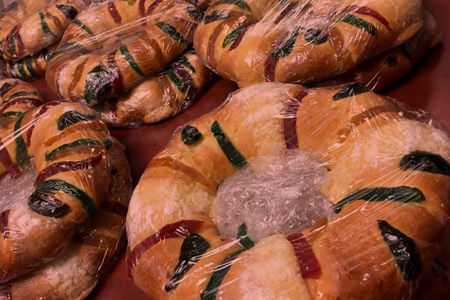Indulging in Rosca de Reyes (King’s Ring) is a “sweet” tradition in the Spanish and Latino community. This beloved king’s cake is a decadent pastry traditionally celebrating Epiphany, a series of four key holidays in the Catholic faith and cherished by the Latino population. The Feast of the Epiphany is the primary celebration. Due to this, millions accross the globe celebrate in the first week of January.
Many share this pastry on January 6 to align with Dia de Reyes (King’s Day). As a result, roscas can be found at Mexican supermarkets and panaderias throughout January and during the Christmas season. The arrival of the Three Wise Men has become synonymous with eating Rosca de Reyes, and for those in Latin America it’s the peak of the holiday season.
Latino Community Celebrations Around the World
Mexico observes this festive day with the reveal of a mile-long Rosca de Reyes. As a result, housands of attendees get to enjoy the delicious treat. It’s common for Latino businesses to close for the day of Epiphany to celebrate with the local community.
While Santa Claus is the star of the holiday season in many Western countries, Latin America is different. Instead, the Three Wise Men (known in the Latino community as Melchor, Gaspar and Baltasar) are revered as gift bearers. Legend says that The Three Wise men leave gifts in or near children’s shoes, encouraging children to place their shoes in easy-to-find areas.

Sweetness of the Season
Based on the story of King Herod, whose mission was to find and kill Jesus, it’s a tale of love, faith, and dedication. The Three Wise Men told Mary and Joseph about King Herod’s plan, urging the new parents to hide baby Jesus. Most notably, the Wise Men were behind saving Jesus as a newborn. It was those three watchful men that protected Jesus, Mary and Joseph from the wrath of King Herod. Therefore, inside each cake, there’s a small, plastic Jesus tucked away.
Finding Baby Jesus in the Rosca de Reyes has various meanings depending on the country. In Mexico, whoever finds the figurine is in charge of hosting a dinner party on February 2.
Find out more about Latin community holidays and traditions. Have you heard about El Dia de los Muertos?
